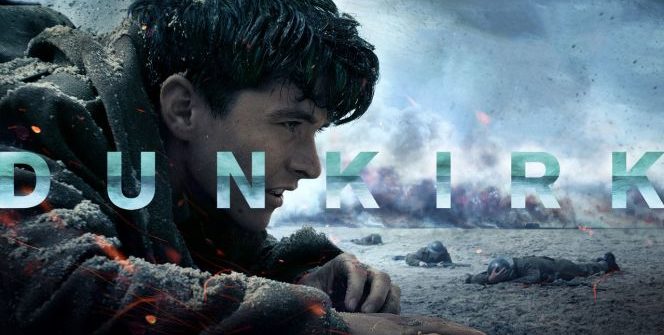MOVIE REVIEW – You won’t see a single German soldier in this WW II movie. You won’t even hear their voice. You only see and hear the bullets, which kills any British soldier instantly, their warplanes, which are bombing battleships and shooting British planes down. This movie isn’t about a war hero or heroes either, nor truly the historical act of saving 340.000 British soldiers. No, Christopher Nolan’s masterpiece is about fear. Deep, agonizing fear of a faceless, silent enemy who can cause sudden death. Dunkirk is about what truly those young soldiers experienced.
While we can’t stress enough, that “Dunkirk” is Christopher Nolan’s best film, it’s also one of the best war films ever made, distinct in its look, in its approach and on the effect which it has on its viewers. There are movies — they are rare — that lift you out of your present circumstances and immerse you so fully in another experience that you watch in a state of jaw-dropped awe. “Dunkirk” is that kind of movie.
Live to fight another day
The battle of Dunkirk was far from a victory, but a successful evacuation and fortunately Nolan doesn’t try to give us another predictable tale of triumph. When France fell to the German army in 1940, 400,000 Allied soldiers, most of them British — basically the entire British Army — were stranded on the beach, needing transport across the English Channel. To convey a sense of that day, Nolan was focusing on a handful of soldiers, sailors, RAF pilots and civilian volunteers, who were all struggling to do their part and go home.
Thanks to history books, we know that almost 340,000 were successfully evacuated and lived to fight another day — and for years after that — and that Hitler actually missed his best and only chance to win World War II in a single blow. Still, Nolan takes us into a mindset that is not aware of these things. He throws us into the middle of the action, where there is no grand scheme and no overview, just moment-by-moment struggle.
Three stories
Indeed, rather than take an impersonal God’s-eye overview of the events of May 1940, when 400,000 troops were pushed back by German forces to the beaches of Dunkirk to face death and defeat if they weren’t rescued, Nolan dissects his film into three separate narrative tracks. The respective strands cover land, sea, and air – an approach that immerses you in the boots-on-the-ground reality for the blood-and-guts men (civilian and military) battling to change history.
The movie starts with a young soldier named Tommy (Fionn Whitehead) who escapes gunfire through the streets of Dunkirk only to arrive at the crowded, desperate beaches. Those narratives unfold in different times: the story of troops on the shore begins a week before the climax; the journey of Dorset sailor Mr. Dawson’s (Mark Rylance) sea-based rescue mission starts a day ahead; and the tale of two and the tale of two fighter pilots, Farrier and Collins (Tom Hardy and Jack Lowden), kicks off an hour before in the skies over the Channel.
Just try to survive
Besides some heroic acts of RAF pilots Mark Rylance Mr. Dawson the movie is mostly about basic human terror and the almost animalistic will to survive. While the movie is neither as poetic as “The Thin Red Line” nor as savage as “Saving Private Ryan,” still, Nolan’s contribution to the war genre owes less to its forefathers than it does unbearably anxious thrillers like “The Wages of Fear” or even “United 93.” Riding Hans Zimmer’s typically bombastic score, which abandons melody in favor of ratcheting up the tension, “Dunkirk” leverages raw suspense to cut its characters away from their context and throw them back onto themselves.
Indeed, few movies have so tangibly expressed the pure isolation of fear and the extent to which history is frequently made by people who are just trying to survive it. Very few movies have so intensely illustrated that one man can only do as much for his country as a country can do for one of its men. Still, Nolan, by stressing that grim truth to its breaking point, also presents us a simple idea: we may die alone, but we live together.
-BadSector-
Dunkirk
Directing - 9.6
Acting - 9.5
Story - 9.6
Visuals/Audio - 9.7
Ambiance - 9.8
9.6
MASTERPIECE
Indeed, few movies have so tangibly expressed the pure isolation of fear and the extent to which history is frequently made by people who are just trying to survive it. Very few movies have so intensely illustrated that one man can only do as much for his country as a country can do for one of its men. Still, Nolan, by stressing that grim truth to its breaking point, also presents us a simple idea: we may die alone, but we live together.


















Leave a Reply